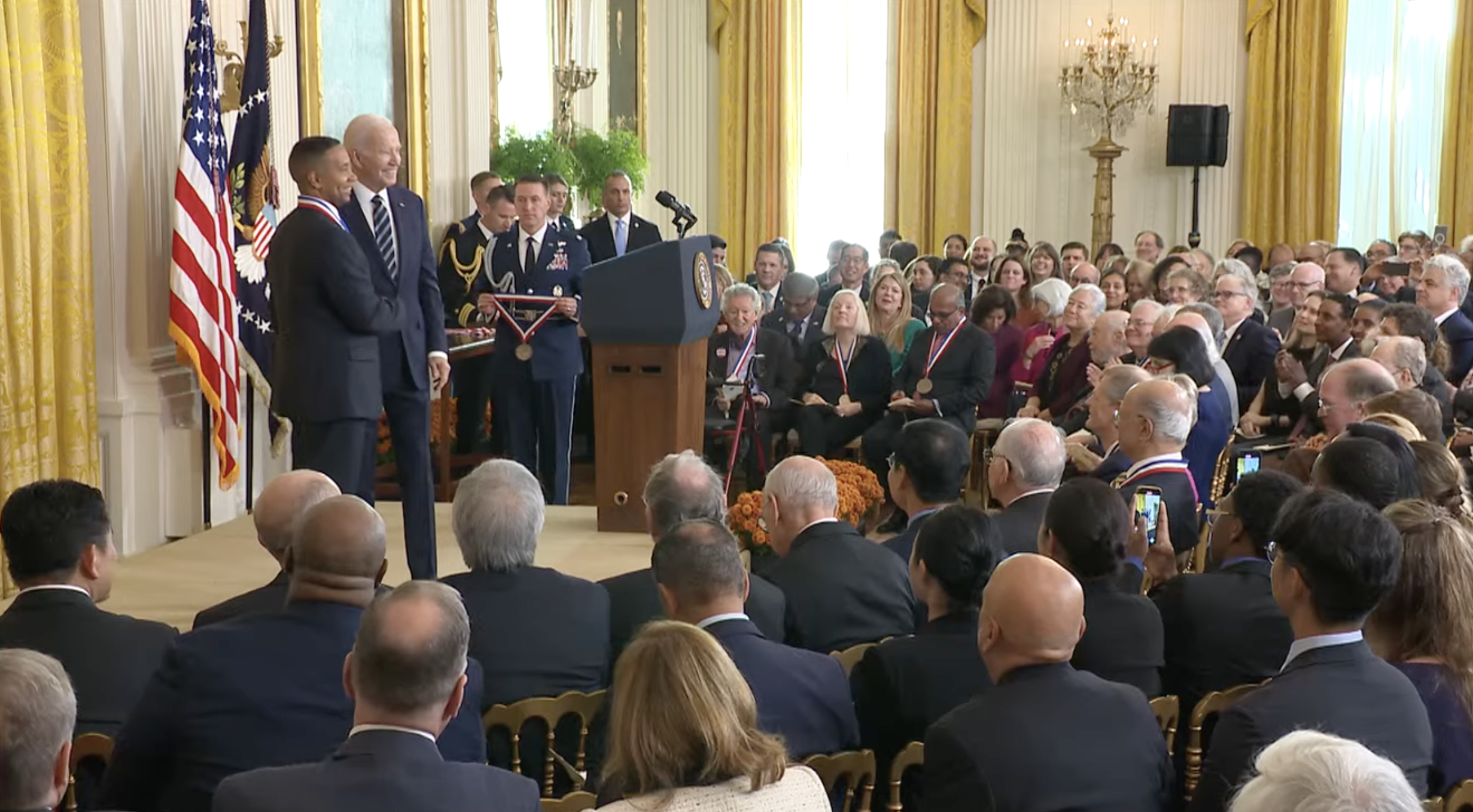President Joe Biden honored University of Florida computer science professor Dr. Juan Gilbert at the White House today with the National Medal of Technology and Innovation for pioneering a universal voting system that makes voting more reliable and accessible for everyone and for increasing diversity in the computer science workforce.
The National Medal of Technology and Innovation, or NMTI, is the nation’s highest honor for technological achievement, bestowed by the president of the United States on leading innovators for their outstanding contributions to America’s economic, environmental and social well-being.
As a computer scientist, educator and researcher, Gilbert, the Andrew Banks Family Preeminence Endowed Professor and chair of UF’s Department of Computer & Information Science & Engineering, has dedicated much of his career to finding ways to improve election technology, with the ultimate goal of protecting democracy.
To that end, he invented Prime III, an open-source voting system that accommodates individuals with physical disabilities as well as ensures the reliability and security of every vote. Prime III was the first open-source voting system to be used in federal, state and local elections in the United States.
“The mission of the research enterprise at the University of Florida is to make a positive difference in the lives of people in the state, the nation, and the world, both in the present and in the future,” said UF President Ben Sasse. “Dr. Juan Gilbert is doing just that. We could not be more pleased.”
The National Medal of Technology and Innovation recognizes those who have made lasting contributions to America’s competitiveness, standard of living, and quality of life through technological innovation and to recognize those who have helped strengthen the nation’s technological workforce.
“Dr. Gilbert’s recognition from the White House is a great source of pride for UF and our college, and a fitting honor,” said Forrest Masters, interim dean for UF’s Herbert Wertheim College of Engineering. “His inclusion into this cadre of eminent innovators speaks to the importance of his work in addressing some of our society’s most pressing challenges, and his commitment to the real-world technological solutions that distinguish us as one of the most inventive universities in the nation.”
Gilbert’s interest in voting security grew after the 2000 U.S. presidential election exposed flaws in the country’s voting technology. As a freshly minted Ph.D. and professor, he went to work to come up with a solution and designed technology that can adapt to voters of varied abilities.
“We were just trying to fix a problem,” Gilbert said. “If you can’t vote, how is that different from not having the right to vote? What is gratifying is changing the history of voting.”
Through his expertise in advancing computer software and technology, Gilbert focuses on the point where technology intersects with people and improves the outcome of that interaction. At UF, he leads the Computing for Social Good Lab, which designs and evaluates computational technologies as they relate to human conditions. In addition to his work with Prime III, he has developed software that uses artificial intelligence to address the issues of diversity in admissions and hiring and created an app that allows police officers to initiate a video call with the driver they have just pulled over.

Juan Gilbert and President Joe Biden during a White House ceremony
Gilbert attended college at Miami University in Oxford, Ohio, 20 minutes from where he grew up in Hamilton, Ohio. While he hadn’t planned on becoming an academic, in 2000 he was the first Black person at the University of Cincinnati to receive a Ph.D. in computer science. Ever since, Gilbert has worked to diversify the field and encourage students from underrepresented groups to pursue graduate degrees. Many of the graduate students in his lab are from underrepresented groups, and Gilbert spends time doing outreach at organizations like UF’s chapter of the National Society of Black Engineers.
“I’ve always wanted to help other people, and I saw science as empowering,” Gilbert said.
Gilbert’s work as a researcher, teacher, and mentor has not gone unnoticed. He received the Presidential Award for Excellence in Science, Mathematics, and Engineering Mentoring from President Barack Obama in 2011.
Gilbert is a Fellow of the Association for Computing Machinery (ACM), American Association of the Advancement of Science (AAAS), the IEEE and the National Academy of Inventors (NAI). He also was recognized with the 2021 ACM Social Impact Award, the 2018 Computer Research Association's A. Nico Habermann Award, and the AAAS 2014 Mentor Award. He was named a 2015-2106 AAAS-Lemelson Invention Ambassador, Speech Technology Luminary by Speech Technology Magazine and a national role model by Minority Access Inc.
With the motto “Change the World” hanging in his lab, Gilbert and his students and colleagues are doing just that, especially in the field of voting technology.
“In the future, everyone is going to use technology to vote, and it will definitely be inspired by our work,” he said. “People have died in this country for the right to vote, and we’re committed to making voting more accessible for everyone.”